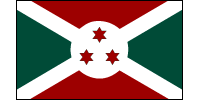| Country (long form) |
Republic of Burundi |
| Capital |
Bujumbura |
| Total Area |
10,745.22 sq mi
27,830.00 sq km
(slightly smaller than Maryland) |
| Population |
6,223,897 (July 2001 est.)
note: estimates for this country explicitly take into account the effects of excess mortality due to AIDS; this can result in lower life expectancy, higher infant mortality and death rates, lower population and growth rates, and changes in the distribution of population by age and sex than would otherwise be expected |
| Estimated Population in 2050 |
16,086,866 |
| Languages |
Kirundi (official), French (official), Swahili (along Lake Tanganyika and in the Bujumbura area) |
| Literacy |
35.3% total, 49.3% male, 22.5% female (1995 est.) |
| Religions |
Christian 67% (Roman Catholic 62%, Protestant 5%), indigenous beliefs 23%, Muslim 10% |
| Life Expectancy |
45.15 male, 46.99 female (2001 est.) |
| Government Type |
republic |
| Currency |
1 Burundi franc (FBu) = 100 centimes |
| GDP (per capita) |
$720 (2000 est.) |
| Industry |
light consumer goods such as blankets, shoes, soap; assembly of imported components; public works construction; food processing |
| Agriculture |
coffee, cotton, tea, corn, sorghum, sweet potatoes, bananas, manioc (tapioca); beef, milk, hides
|
| Arable Land |
44% |
| Natural Resources |
nickel, uranium, rare earth oxides, peat, cobalt, copper, platinum (not yet exploited), vanadium, arable land, hydropower |
|


|